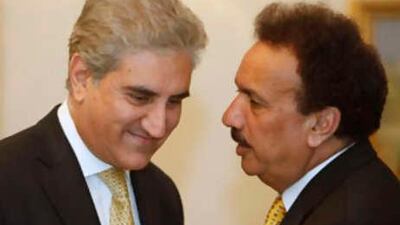The Pakistan foreign minister Shah Mehmood Qureshi today said his country has offered a joint team to help India investigate the Mumbai attacks. "The government of Pakistan has offered a joint investigation mechanism, and we are ready to compose such a team which will help the investigation," he said in a televised statement. Mr Qureshi said that his government "wanted to get to the bottom of" the investigation and was ready to extend all possible co-operation and assistance. The minister, speaking in Urdu, said both governments needed to show "maturity, seriousness and patience" amid rising tensions between the nuclear-armed rivals after suspected Pakistani militants killed 188 people in the Mumbai attacks. However Pakistan's top diplomat dodged Indian demands to hand over 20 suspected militants said to be living on its soil, including the founder of the militant group Lashkar-e-Taiba, which has been named as prime suspect for the attacks. "I have offered this (co-operation) to my Indian counterpart Pranab Mukherjee and to the Indian government in response of the demarche. We have sent this reply that Pakistan is ready to extend all kind of co-operation and assistance." India has already demanded Pakistan take "strong action" against those responsible for the attacks, and the US has pressured Islamabad to co-operate. The moves come as the government faces widespread accusations of security and intelligence failures after militants carried out a three-day attack across India's financial capital, killing 172 people and wounding 239. The 10 gunmen had trained for months in camps operated by a banned Pakistani militant group before slipping into Mumbai from the sea, the only known surviving attacker told police. India's foreign intelligence agency received information as recently as September that Pakistan-based militants were plotting attacks against Mumbai targets, according to a government intelligence official familiar with the matter. The information was then relayed to domestic security officials, the official said, speaking on condition of anonymity because the person was not authorised to talk publicly about the details. The prime minister Manmohan Singh, who has promised to strengthen maritime and air security and look into creating a new federal investigative agency, met today with top security aides to review any government lapses. Among the prisoners sought by India is Dawood Ibrahim - a powerful gangster, the alleged mastermind of 1993 Mumbai bombings, and India's most-wanted man. Also included is Masood Azhar, a terror suspect freed from an Indian prison in exchange for the release of hostages aboard an Indian Airlines aircraft hijacked on Christmas Day 1999. "We will await the response from Pakistan," Mukherjee said. In Mumbai, from the FBI and Britain's Scotland Yard met with top Indian police as they prepared to help collect evidence, a police official said. Yesterday, soldiers removed the remaining bodies from the shattered Taj Mahal hotel, where the standoff finally ended on Saturday morning. The army had already cleared other siege sites, including the five-star Oberoi hotel and the Mumbai headquarters of an ultra-Orthodox Jewish group. India's financial hub has returned to normal to some degree, with parents dropping their children off at school and shopkeepers opening for the first time since the attacks, which Indian authorities blamed on the banned Pakistani militant group Lashkar-e-Taiba. While the cross-border rhetoric between Pakistan and India has increased since the attacks, both countries - by their often-antagonistic standards - carefully refrained from making statements that could quickly lead to a build-up of troops along their heavily militarised frontier. In India, Pakistan's high commissioner to the country met with foreign ministry officials and was told that "elements from Pakistan" had carried out the attacks, said ministry spokesman Vishnu Prakash. His phrasing, though, carefully avoided blaming the Pakistani government. The commissioner was told that India "expects that strong action would be taken against those elements", Mr Prakash said. US Secretary of State Condoleezza Rice, who will visit India later this week, said the perpetrators of attacks "must be brought to justice". Pakistan has repeatedly insisted it was not behind the attacks. The Pakistani president Asif Ali Zardari said yesterday the gunmen were "non-state actors," and warned against letting their actions lead to greater regional enmity. "Such a tragic incident must bring opportunity rather than the defeat of a nation," Mr Zardari told Arj television. "We don't think the world's great nations and countries can be held hostage by non-state actors." The sole surviving attacker, Ajmal Qasab, told police his group trained over about six months in camps operated by Lashkar in Pakistan, learning close-combat techniques, hostage-taking, handling of explosives, satellite navigation, and high-seas survival skills, according to two Indian security officials familiar with the investigation. They spoke on condition of anonymity because they were not authorised to speak publicly about the details. Lashkar was banned in Pakistan under pressure from the US in 2002, a year after Washington and Britain listed it as a terrorist group. Mr Qasab told investigators the militants hijacked an Indian vessel and killed three crew members, keeping the captain alive long enough to guide them into Mumbai, the two security officials said. The men, ages 18 to 28, then came ashore in a dinghy at two different Mumbai areas before slipping into the city in two teams, officials said. The gunmen struck at several sites, including a train station, where they mowed down police and passersby; the Jewish centre; and the two luxury hotels, representing the city's wealth and tourism, reportedly seeking out Westerners. The 19 foreigners killed were Americans, Germans, Canadians, Israelis and nationals from Britain, Italy, Mexico, Japan, China, Thailand, Australia, Singapore and Mexico. * AP and AFP

Pakistan offers joint investigation
Pakistan offers a joint investigation team but refuses Indian demands to hand over 20 suspected militants.
Most popular today
